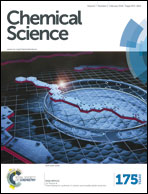Rhodium-catalyzed oxidative amidation of allylic alcohols and aldehydes: effective conversion of amines and anilines into amides†
Abstract
The rhodium-catalyzed oxidative amidation of allylic alcohols and aldehydes is reported. In situ generated [(BINAP)Rh]BF4 catalyzes the one-pot isomerization/oxidative amidation of allylic alcohols or direct amidation of aldehydes using acetone or styrene as the hydrogen acceptor. The conditions are general, affording good to excellent yields with a wide array of amine and aniline nucleophiles, and chemoselective, other alcohols do not participate in the oxidation reaction. Utilization of biphasic conditions is critical, as they promote an equilibrium between the imine/enamine byproducts and the hemiaminal, which can undergo oxidation to the amide.

- This article is part of the themed collection: ISACS19: Challenges in Organic Chemistry


 Please wait while we load your content...
Please wait while we load your content...